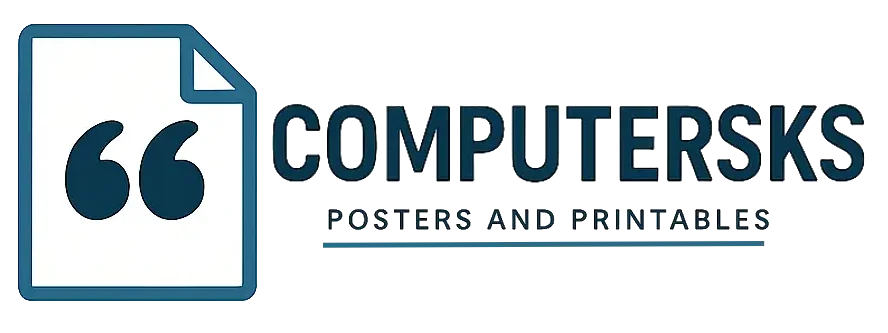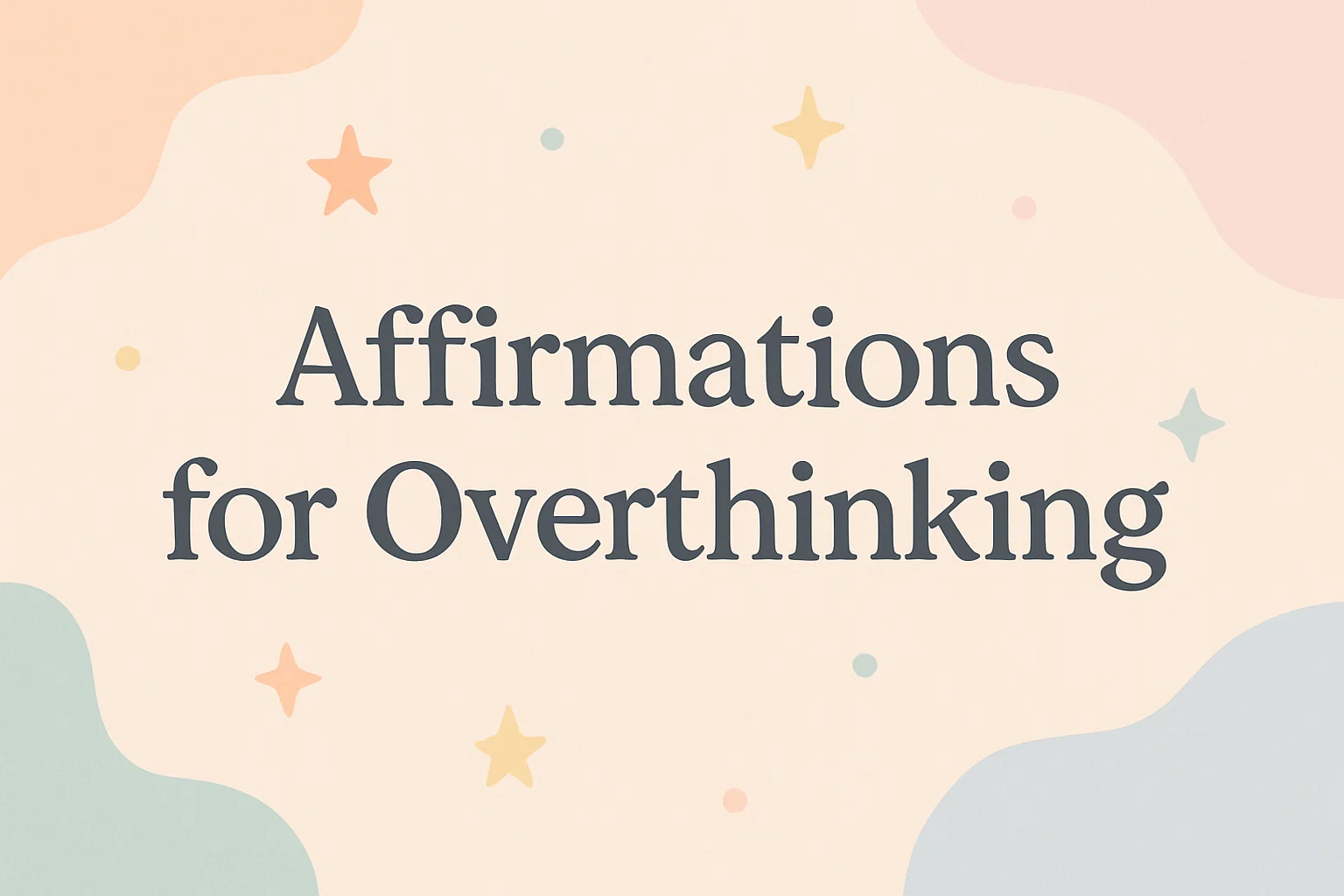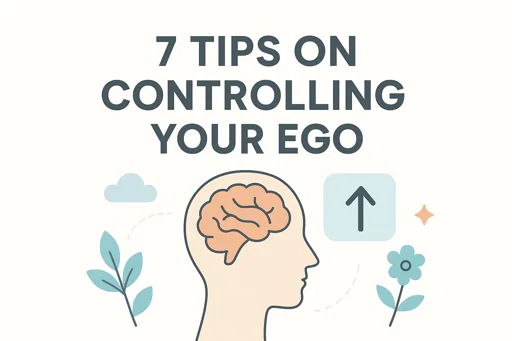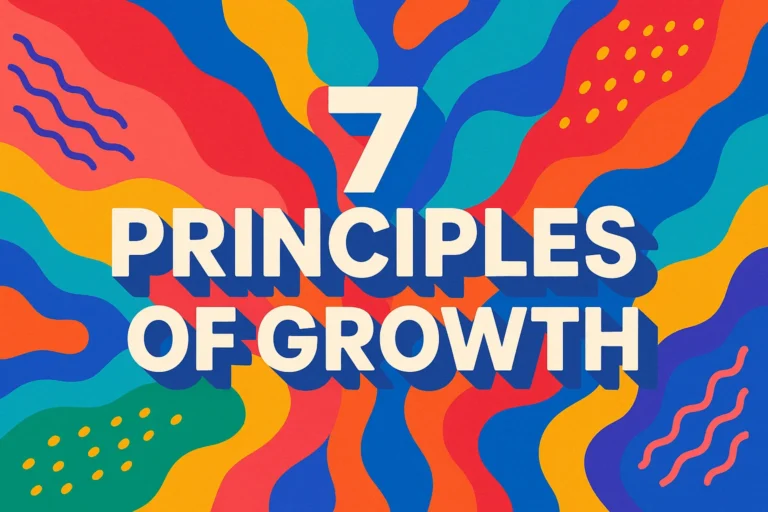Psychology Skills for Overthinking Empowering Affirmations to Calm Your Mind
Ever had a thought, and then a thought about that thought, and then a sudden, panic-inducing realization that your thoughts are now thinking themselves without your permission? Yeah, me too. Welcome to the overthinking club—it’s the worst exclusive membership you never wanted. You’re just trying to fall asleep, and your brain decides it’s the perfect time to conduct a full-scale performance review of that awkward thing you said in 2012.
It’s exhausting, right? Your mind becomes a browser with 47 tabs open, and one of them is always playing loud, anxiety-inducing music you can’t figure out how to turn off.
But what if I told you there’s a way to gently close a few of those tabs? Not by fighting your brain, but by working with it. I’ve been down this rabbit hole, and the most surprisingly effective tool I’ve found isn’t some complex psychological technique (though those help, too). It’s something much simpler: affirmations.
Now, before you roll your eyes and mutter “cheesy self-help nonsense,” hear me out. I was the biggest skeptic on the planet. The idea of standing in front of a mirror and telling myself I was a “powerful, confident goddess” made me cringe so hard I nearly pulled a muscle. But when you understand the psychology behind them and tailor them to actually work for an overthinker’s brain, they become less of a mantra and more of a mental circuit breaker.
Why Your Overthinking Brain is Basically a Drama Queen
Let’s get one thing straight: overthinking isn’t a personal failing. It’s not a sign that you’re weak or broken. IMO, it’s often a misguided sign of intelligence and a deep desire to be prepared and avoid pain. Your brain is just trying to protect you by running every possible scenario. The problem is, it’s a wildly overzealous bodyguard.
Your brain’s primary job is to look for threats. It’s wired for survival, not happiness. So, when it can’t find a literal tiger to run from, it will happily invent one out of an unanswered text or a slightly off-hand comment from your boss. This is called the negativity bias—our hardwired tendency to pay more attention to negative experiences than positive ones.
Think about it. You can have ten people compliment your presentation, but you’ll fixate on the one person who looked bored. Your brain latches onto that one potential “threat” and magnifies it. This is where the overthinking spiral begins. Your amygdala (the brain’s alarm system) sounds the alarm, and your prefrontal cortex (the logical, rational part) gets hijacked. You’re now operating from a place of fear, not fact.
So, how do we calm the drama queen? We can’t just yell “CALM DOWN!” at it. That never works, for brains or for actual people. We have to gently redirect its attention.
The Science Bit: How Affirmations Actually Rewire Your Brain
This is where it gets cool. Affirmations aren’t just wishful thinking; they have a measurable, biological impact. It’s not magic—it’s neuroscience.
Studies using MRI scans have shown that practicing self-affirmation activates the brain’s reward centers—the same regions that light up when you experience something that makes you happy, like eating your favorite food or winning a game. At the same time, it can reduce activity in the amygdala, that hyper-vigilant threat-detector we just talked about.
In simple terms, affirmations help shift your brain from a state of panic to a state of safety. They are a form of cognitive restructuring. You’re essentially handing your overthinking brain a new, better script to read from.
When you consciously choose a positive, present-tense statement and repeat it, you’re forging new neural pathways. You’re quite literally carving out a new mental habit to replace the old, worn-out path of catastrophic thinking. It’s like building a mental shortcut back to calm.
Crafting Affirmations That Don’t Make You Gag
This is the most important part. Generic, fluffy affirmations often fail because your overthinking brain immediately rebels. “I am abundant and prosperous,” it scoffs, while staring at an overflowing laundry basket and a bank account that’s… not. The key is to create affirmations that feel believable and relevant to you.
The best affirmations for overthinkers are grounded, realistic, and action-oriented. They aren’t about denying reality; they’re about changing your perspective within your reality.
Here’s how to build one that actually works:
- Use the Present Tense: Your brain responds to what is happening now. Instead of “I will be calm,” try “I am choosing calm in this moment.”
- Keep it Believable: If “I am perfectly confident” feels like a lie, scale it back. Try “I am learning to trust myself more every day.” See the difference? One feels fake, the other feels like a work in progress, which is something your logical brain can accept.
- Make it Personal: Tie it directly to your specific anxiety. Stressed about a work decision? “I am capable of making thoughtful and sound decisions.”
Your Arsenal of Empowering Affirmations
Ready to try some on for size? Here’s a starter pack, broken down by common overthinking triggers. Mix and match, tweak them, make them your own.
For When You’re Catastrophizing & spiraling
This is when one small thing leads to a mental movie where you’re living in a box under a bridge. Time to interrupt that script.
- I am safe in this moment. Right now, I am okay. This is my absolute go-to. It brings you back to the present, where the imagined disaster isn’t actually happening.
- I don’t have to have all the answers right now. Permission to pause? Granted.
- I can handle what comes my way. This affirms your resilience without pretending everything is perfect.
- This feeling is temporary. It will pass. A simple, powerful reminder of the impermanence of emotional states.
For When You’re Beating Yourself Up
The dreaded self-criticism spiral. Your inner critic is a jerk, and it’s time to fire it.
- I am doing the best I can with the tools I have right now. This is so compassionate and impossible to argue with.
- My worth is not defined by my productivity or my mistakes. Mic drop. Write this one down everywhere.
- I give myself permission to be a work in progress. Perfectionism is just overthinking’s fancy cousin. This affirmation takes away its power.
- I choose to speak to myself with the same kindness I offer a friend. Why is it so easy to be nice to others and so hard to be nice to ourselves?
For Decision Paralysis
When your brain is stuck on a hamster wheel of “what ifs” and you can’t choose a path.
- There is no perfect choice, only the right choice for me right now. This eliminates the pressure of perfection.
- I trust myself to make a decision. Full stop. So powerful.
- Even if it’s not perfect, I can learn and adapt from any outcome. This turns fear of failure into curiosity about learning. Big shift!
- My intuition is a valuable guide. This reminds you to stop analyzing for a second and just feel what’s right.
How to Actually Make Them Stick (It’s Not What You Think)
Knowing the affirmations is one thing; making them a part of your mental toolkit is another. You don’t need to schedule an hour of chanting. It’s about micro-moments.
- Pair Them with an Anchor: Link your affirmation to an existing habit. Say it while you brush your teeth, wait for your coffee to brew, or are stopped at a red light. Habit stacking is a game-changer.
- Write Them Down: Don’t just think them—ink them. Keep a notebook by your bed and write one out five times before you sleep. It helps solidify the new neural pathway.
- Say Them Out Loud: Hearing your own voice say a kind, firm statement has a different weight than just thinking it. It commands your brain’s attention.
- Set a Phone Reminder: Have a notification pop up in the middle of the day with your current favorite affirmation. It’s a random act of kindness from past-you to present-you.
FYI, you’re going to feel silly at first. I definitely did. That’s your old, cynical neural pathway throwing a tantrum. Do it anyway. The silliness fades, and the calmness remains. 🙂
The Bottom Line: You Are the Boss of Your Brain
Overthinking makes you feel like a passenger on a runaway train of your own thoughts. Affirmations are a way to gently walk up to the conductor’s cabin and take the wheel. They are a psychological skill—a repatterning tool that empowers you to curate your inner dialogue.
It’s not about slapping a positive band-aid on a real problem. It’s about consciously choosing the narrative you want to believe, especially when your brain is offering you a worst-case scenario on a silver platter.
So the next time you feel that familiar spiral starting, take a deep breath and pick one. Just one. Throw it at the overthinking like a mental water balloon. It might not fix everything instantly, but it will create a moment of pause. And in that pause, you’ll find a sliver of space—a little bit of calm where you get to remember that you, not your thoughts, are in charge.
What’s one affirmation you’re going to try today?







